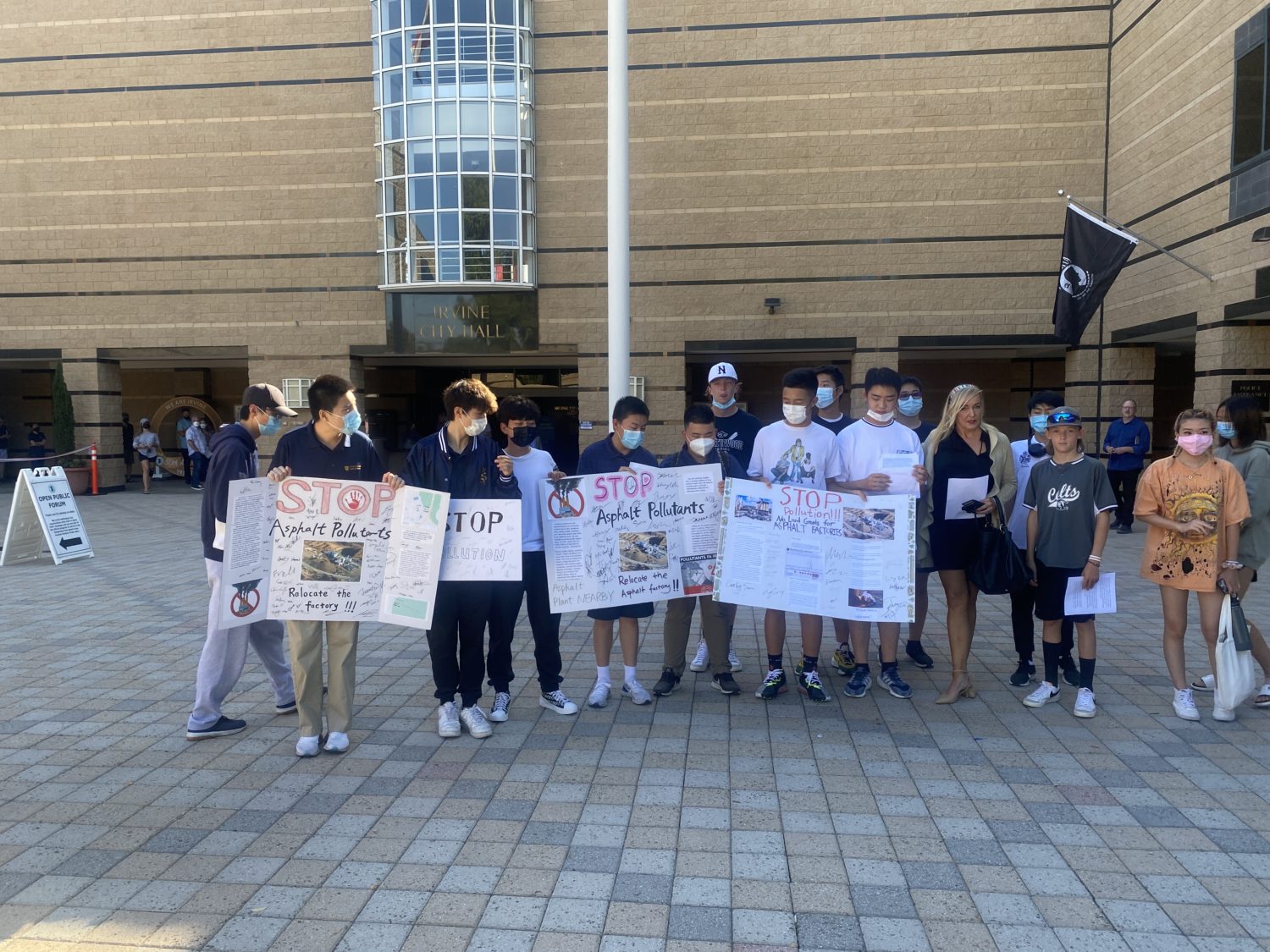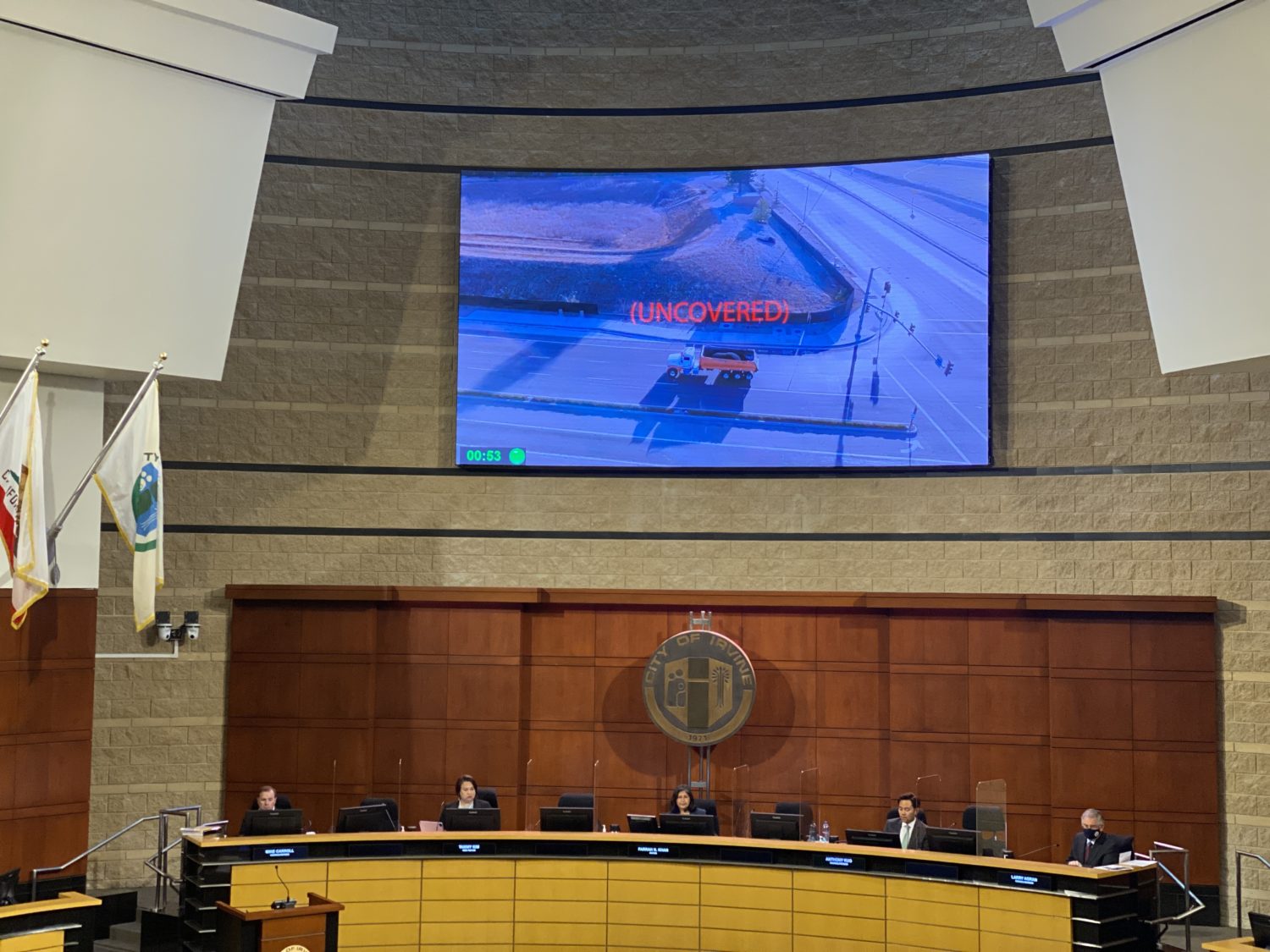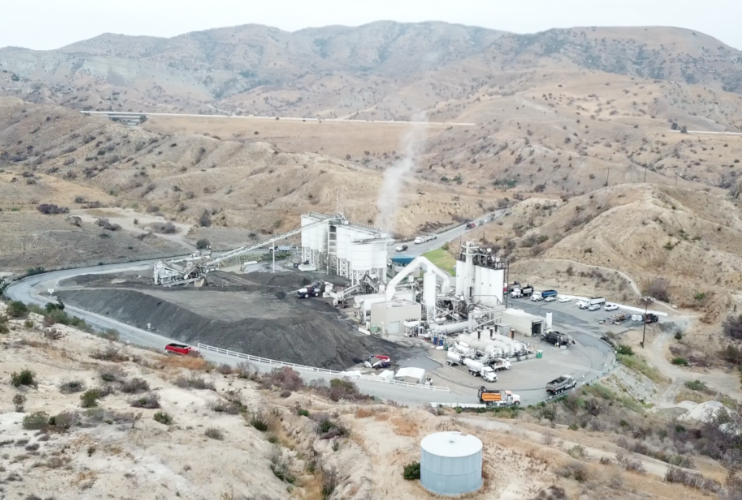The All American Asphalt facility has been a source of frustration for Irvine residents who say the facility’s emissions and foul odors are a burden on their quality of life. Additionally, many say they are living in fear, emphasizing that the Irvine City Council has not done enough to address the community’s requests for more independent research on the air quality near their homes.
Despite testing from the South Coast Air Quality Management District that indicates that the asphalt facility was one of the largest producers of known carcinogens in Irvine in 2020, some homeowners near Orchard Hills say the existence of the facility was not disclosed prior to purchasing.
During a phone interview with Irvine Weekly on Thursday, Sept. 8, Irvine resident Sasha McFadden said that after an extensive search, her family found a home to purchase in Orchard Hills.
“We put a letter in informing the seller that we’re moving in with our baby, we’re a family. Paid a couple hundred dollars for inspections, got into escrow with them, sent our deposit in, and basically didn’t have any contingencies removed on the property,” she said. “The hazard reports came through and there was nothing spoken about the asphalt factory.”
McFadden said after researching the area, they discovered the facility was 2,500 feet from their home in Orchard Hills, but was never disclosed in reports.
“It was the closest property to the asphalt factory,” McFadden explained. “We are moving back to Los Angeles.”
The property’s environmental report, which was obtained by Irvine Weekly, did not indicate an asphalt facility was located anywhere near Irvine.
Senator Dave Min, who represents Irvine, said he has been made aware of the foul odors in Irvine, adding that he wants to do whatever he can to help.
When asked if he had ever heard anything similar to the McFadden family’s scenario – in which the asphalt facility was not disclosed in the environmental report during a home sale – Min said he was unaware there were issues surrounding the potential non-disclosure of the facility itself.
“That is very interesting. Maybe one thing we can do is return this to Attorney General [Rob] Bonta, and I’d be happy to connect those homeowners,” Min said during a phone on Wednesday, Sept. 15. “If there are home sale agreements without disclosures I think that is a fraud. I used to teach contracts law and that is a material omission.”
On Tuesday, Sept. 14, approximately 50 public speakers, including the McFadden family, local students and a representative of Senator Dave Min, came to Irvine City Council during a presentation to discuss the most recent air samples taken near the All American Asphalt Facility by the South Coast Air Quality Management District.

Photo by Evan J. Lancaster
While AQMD has been adamant that air sampling results do not indicate that emission levels exceed long-term health risk levels, members of the Irvine community continued to urge the council to seek alternative measures for independent research.
Prior to the meeting, Irvine Weekly spoke with Dr. Dean Baker, a retired UC Irvine epidemiologist, who has worked with the local community group Non-Toxic Neighborhoods. Baker explained that while AQMD has sampled the air near Orchard Hills for six months, the testing was limited to volatile organic compounds.
“That sampling was 24-hour samples for volatile organic compounds, which are the primary focus of air emission from facilities like that,” he said. “But they’re not the only possible emissions shown on the AQMD website.”
Baker was invited by the Irvine City Council to the Sept. 14 meeting to share his expertise on what other measures can be done in terms of more independent air sampling studies.
From his perspective, Baker said he understands the frustration of the community, considering the timeline of these issues regarding the emission of known carcinogens, foul odors, volatile organic compounds, and even small metals.
“Apparently, there were some errors in emissions reports from AAA, I believe in 2016, and they’re still trying to get corrections on that and do the risk analysis, based on the accurate emission report data, that’s due out in October,” Baker explained. “It’s frustrating to the community just because it’s taken so long.”
During the meeting, several residents played videos of trucks carrying asphalt departing from the All American Asphalt facility. Many were traveling with uncovered asphalt, through residential streets in Irvine.
This aspect of uncovered asphalt traveling through neighborhoods was a major concern of residents during the meeting. Many said they were under the impression that asphalt trucks were required to be covered while driving.

Photo by Evan J. Lancaster
However, Irvine Police Chief Mike Hamel explained that no such regulation existed.
“There is a vehicle code that governs that loads must be covered, however there is a specific carve out that asphalt trucks do not need to be covered,” Hamel explained. “So there is no provision to enforce asphalt trucks that are not covered.”
In addition to the dozens of Irvine residents who addressed the council Tuesday night, James Black, a representative for state Senator Dave Min, came to deliver a statement on behalf of the senator, supportive of the community’s concerns.
In his message, Min said he was thankful to the City Council for addressing the issue and hoped a resolution could be reached, adding that his staff has followed the issue of potentially harmful emissions in Irvine closely.
“I hope we can begin to reach some productive outcome soon which will help address the legitimate concerns of many thousands of residents of north Irvine like Orchard Hills, Portola Springs and others,” Min’s statement read. “First, there’s the concern that these fumes are tied to toxic emissions that negatively impact air quality to the point where this is a public health concern. Second, there’s the concern that such fumes simply by virtue of their strong and noxious odors may create an unacceptable nuisance to those impacted by them, negatively impacting their mental health and well-being.”
While the AQMD air sampling discussion took more than three hours during Tuesday’s meeting, the item did not present the Irvine City Council with an opportunity to vote. While Irvine City Council members offered suggestions that included asking Senator Min to make changes in legislation regarding the operation of asphalt facilities.
Min spoke in-depth with Irvine Weekly via phone, explaining that any changes in legislation would be reflected at a state level, adding that impacts would be felt industry-wide.
“I can’t just do it for one plant, and the impacts of that would be massive and would be a huge lift and I’m not sure if anyone has thought about the pros and cons of that if it’s a good bill. But that’s the only type of action we can take. In the big picture – should we change the air quality standards to include things that are not being picked up right now – should we ban certain types of practices? Anything we do would probably have to be across the state, because this impacts private industry.”
Min added that Irvine residents tell him they are convinced that there is constant toxicity, pointing to things All American Asphalt being notified of AQMD’s testing and subsequently decreased production to “game the system.”
“I don’t know if that’s true or not, but if that’s true that would probably make it appropriate for the AQMD to come down and do more testing,” said Min. “Unfortunately, I just don’t see state legislation.”
While Irvine Mayor Farrah Khan admitted that the current system for reporting odors was archaic, the city attorney did not present suggestions on how to move forward with relocating the facility, or the possibility of shutting the asphalt facility down completely.
“The limitations on what we can and cannot do change, but that doesn’t mean that I don’t care or that I’ve flipped. I don’t think we should accept any level of air pollution that negatively impacts our community,” Khan said. “I don’t want our community to think that the plant will be closed or relocated any time soon, but I do want you to know that we’re going to do everything we can to mitigate where we are at right now. This issue is a reminder that government as a whole must do better, particularly when it comes to regulation of the air we breathe.”
Advertising disclosure: We may receive compensation for some of the links in our stories. Thank you for supporting Irvine Weekly and our advertisers.

